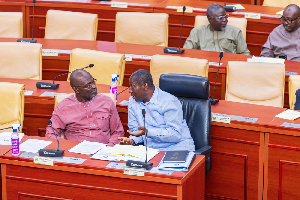The journalist, Samuel K. Obour, thinks that IMANI's entire posture towards the newly 'commissioned' Komenda sugar factory is one of 'obstinate cynicism'.
Mind you IMANI was probably the only organisation that took the announcement that Ghana was going to take a loan of $35 million from India's main export promotion bank and give it to a private engineering firm from India to set up and run a sugar factory in Komenda on behalf of the government of Ghana seriously enough to write clearly about what we believed should be done to ensure the success of the enterprise.
IMANI was probably the only organisation to lay out clearly how undercapitalised the project was and how therefore it was essential to be careful about the way the government was going about it. This was in mid-2014.
Fast forward to 2016, the processing plant (mill and refinery) has been built but resources available have not been sufficient for the outgrower scheme, auxiliary infrastructure and working capital needs of the project to be met. So government has now borrowed $24.5 million to sort out the outgrower scheme and develop its own nucleus farm.
Obviously, given that sugar cane takes a year to grow and considering the fact that the resources needed to operate the factory are still short of the reasonable minimum (we have ignored marketing costs throughout), it will take over a year before we start to see any significant benefits from the factory.
Since time is money, this is clearly a loss to the country.
Nothing stopped the Government from heeding to earlier calls to start investing in the outgrower project through the provision of credit to the farmers and the development of irrigation projects among others in parallel to the construction of the factory.
Rather than people taking cue from IMANI's extraordinary prescience in this matter, and being guided thereby to take its recent comments seriously, the organisation has been bombarded with all manner of choice adjectives. Mr. Obour's comments are however more interesting since he is a journalist.
2 years after the Komenda project was broached, the following are a tiny selection of questions journalists like Mr. Obour have failed to be able to obtain answers to on behalf of Ghana:
A. How much credit/finance in total is required to run the Komenda factory until it begins to produce enough revenue to be more or less capable of operating without government-guaranteed loans? In the past, many of our factories launched to fanfare have died because they could never graduate to a point where local banks were comfortable enough to provide credit lines.
B. What is the exact legal and commercial arrangement between the Government of Ghana and Seftech, the Indian engineering firm driving the project? Is it a Build-Operate-Transfer or a Build-Operate-Maintain, and who bears the financial risks of operation? What is in it for Seftech?
C. How much sugar cane is grown in Ghana today?
D. How much sugar cane is already being grown within reasonable transport distance of the factory?
E. What is the average price per tonne of sugar cane at the wholesale and general trade levels in ghana? Why is the government vacilating on the price it intends to pay the farmers, shifting from $15 dollars per 1000 stalks/sticks to $22.5 within weeks? Are these numbers being plucked from the air or from an actual scoping and feasibility study? Which journalist has seen that scoping study?
F. Is there any possibility at all of sugar cane or raw sugar being imported to feed the factory? What would the financial picture look like if the country had to rely on imported raw sugar.
G. What is the plan to attract top technical and managerial professionals to the board and management of the company set up or being set up to run the plant? Any CVs so far? You get the picture.
Most Ghanaian journalists have asked virtually No probing questions since this project was broached. I will wager that his post today is Mr. Obour's most comprehensive take on the matter since the controversy ensued, and it is devoted to IMANI, not the government spending our money! What is the thrust of Mr. Obour's criticism?
Firstly, he argues that the government needs to be commended for even thinking about and going forward to source a loan to revive the factory at all.
Secondly, he argues that whatever may be the issue with the factory, it is already up in Komenda and the patriotic thing for everyone to do is to start contributing ideas for the success of the factory and the greater glory of Ghana.
To his mind, IMANI's failure to do this is the very summit of cynicism and unpatriotism. Let's address these points one after the other.
We are in a season in this country of such low expectations that I am not surprised that some people are indeed shocked that one can dare criticise a government for building a factory as opposed to spending the money on....I guess, garden parties at flagstaff house.
In fact, a careful study of this thinking should explain to you why political actors in this country find civil society actors in the cities so irritating. "How can the Accra elites keep on harping about good governance and due diligence when we are building boreholes, KVIPs and feeder roads for people who have never drank voltic in their life before?" they ask.
What is all this talk about 'quality of decision making' when we have built a sugar factory?
The principle is that we should all be marvelously lucky that politicians are not blowing all our money on champagne. How dare we ask for more!!! Here is why some of us are not satisfied merely because occasionally politicians obtain loans in our names and build a factory here and there: We deserve better!
We deserve factories that actually operate long enough to pay back the debts incurred in building them, provide meaningful jobs to our people commensurate with the investment made into them, and serve as a bedrock for more investment into other factories that can create more jobs and enrich our economy further.
IMANI's point for insisting rigorously on how much would be required before the project can be viable was so that we can measure the opportunity cost more effectively.
The government of Ghana receives about $8 billion from Ghanaians every year to spend to improve our lives (loans and grants are secured in our name too, remember that, and at any rate, grants tend to be tiny nowadays). Of that amount, the Government spends the greater chunk paying itself and debts it has incurred in the past. Only about $1.5 billion remains for everything else. Of this amount, roughly $1.3 billion has to go to sustain critical infrastructure, like roads, hospitals, schools etc. which produce returns in a diffuse and long-term manner.
Only about $200M or even less is thus available for what you might call 'public enterprise', that is investments that may produce quicker returns. Given that the government is still involved in hundreds of public enterprises, from building houses to making shoes, it is not difficult to see that the pressure on each dollar is MASSIVE (GNPC alone wants to borrow billions of dollars in our name).
This is the context within which we must adjudge how we should react to the government's decision to build a sugar plant, which may end up costing the country $90 million. Firstly, it throws into stark relief the inadequacy of the argument that because we import a lot of sugar we must automatically invest in sugar.
We also import milk, sunflower oil, palmoil, plantains, perfume, acids, oxygen, nitrogen, refined gasoline, refined diesel, aviation fuel, tomato paste, yoghurt, cotton handkerchiefs, honey, chewing gum, biscuits, condoms, glue, wheat flour, glycerine, vaseline, video games, car paint, and dare I say it, tilapia and pig feet.
If you look at the customs classification of imports in this country, you can see clearly that we import thousands of items and commodities.
We have $22 billion or so of annual imports. Sugar is less than 1% of that. So we could conceivably have hundreds of factories designed to prevent us from importing a dollar worth of anything.
We simply haven't got the resources, from money to technical and managerial competence, to invest in enough factories to produce everything in Ghana. So we must pick and choose.
If a state is the one doing the picking and choosing, then the process is called planning. And we the citizens must demand to see quality and integrity in the planning process. Simple!
One way to do quality planning is to have a clear set of principles that guide the prioritisation matrix, backed by plenty of data. Is that what we have seen in the Komenda case?
I dare say, no. We have seen rather the signs of shoddy planning. Despite having been warned about the undercapitalisation of the venture from the very start, we have waited two years to seek for more money to march the project towards viability. Which raises the question of whether we can trust the same people who chose sugar as an area deserving of $90 million (or even $75 million, if you reduce working capital and contingency requirements to a fraction of what we believe is needed) of Ghana's money?
Should the tenets of accountability not require that a journalist of Mr. Obour's evident passion focuses first and foremost on rigorously questioning the very basis that led to sugar being selected from among all the potential candidates?
Could that decision have been driven by some other factor rather than pure pubic interest. Is a civil organisation like IMANI wrong to spend some time analysing the opportunity cost of investing in sugar cane planting, crushing and refining? And why exactly should such conduct qualify to be described as 'obstinate cynicism'?
Suppose the journalists had shown interest in IMANI's earlier analysis and forced the conclusion on the government that sugar is not a very viable proposition for Ghana (based on return on investment, social impact, and economic growth metrics), and that maybe we should focus on milk, soy derivatives, or pepper paste, would that have been 'obstinate cynicism'?
Given that the journalists did not, what if the data today show that the sugar project is nonviable, should journalists browbeat those whose data and analysis reveal this situation for what it is, or should they demand accountability from those whose decisions led us down the path of the nonviability? Which approach would be less 'cynical'?
But let us give Mr. Obour's arguments some credit and focus on his point about 'redemption' or 'redeemability'. Let us say that he is on to something when he says, 'the factory is already up' so all hands should move on deck to get it to work.
The first question everyone would ask is: would that require more public money than has already been spent?
Since Mr. Obour won't really be able to help us here (he has to date refused to collect any data on the project from the developers or those who have collected such data, or at least he hasn't shared any) we can only move on to the next question: How much more public money would we need for this proposed redemption effort to bear fruit? For what results? Can we spend that money elsewhere for more results? Can we unload the project from the public burden?
These are, of course, preliminary questions. We can choose to move on to others, for example: should the project continue in the same way as planned? Or should it be re-configured? At what cost? For what returns?
The problem is that even were we to angle towards the approach being urged on us by Mr. Obour, he and most journalists shall not create the necessary room to help us do it. In fact, if we were to take his criticism too seriously we wouldn't even start since we would be asking the same questions that he has branded as signs of obstinate cynicism.
For instance, the figures show that at $460 thereabouts, the world price of white sugar is much too low for Ghana to produce sugar profitably and sustainably, though we may of course try, without increasing domestic prices by at least 50% through protectionist measures.
IMANI is happy to debate anyone with serious data who thinks otherwise (or, more plausibly, that a rebound in the price is imminent). The question now is should we artificially inflate domestic prices of sugar through high tariffs? Would the inflationary knock on effects on the price of food be justified? Based on which data and analysis? Would any effort to be guided by such cold, rational, hard-nosed analysis be tantamount to obstinate cynicism.
Suppose IMANI was to argue that the plant be reconfigured to produce more ethanol, brown sugar, and filtercake at X investment for Y% improvement on the internal rate of return (IRR) or even plain return on investment (ROI) on the project, would that satisfy Mr. Obour? Even if it requires that IMANI first of all totally and thoroughly demonstrate through financial analysis that white sugar is a poor focus of investment notwithstanding the $60 million already secured for the specific purpose of producing white sugar?
Given that Mr. Obour's prescription is that IMANI and everyone else should do everything to push the project to success on its current trajectory, i.e. the production of white, granular, sugar, how then can one ever escape this tight noose of obstinate cynicism?
One is led to the belief that this kind of 'patriotic journalism' can only countenance a situation whereby all civic-minded Ghanaians seeking to comment on the sugar-endeavour (or is it 'palaver'?) line up along the Independence Avenue singing hymns of praise to the great factory:
"Komenda oo! Komenda oo! Thou art Mighty among factories! Thou shall produce sugar and not bitterness! Thou shalt spew sucrose and not negativity! 10,000 statistics shall fall by your right side, and 1000 points of inflation by your left hand! But you shall not be touched! Great is thy resourcefulness!" Our patriotic duty done, and Mr. Obour smiling contentedly, thus shall the world behold the fall of the house of obstinate cynicism. All to the greater glory of Ghana, of course.
Opinions of Monday, 6 June 2016
Columnist: Bright Simons
Bright Simons takes on journalist over Komenda Sugar Factory
 Bright Simons
Bright Simons














